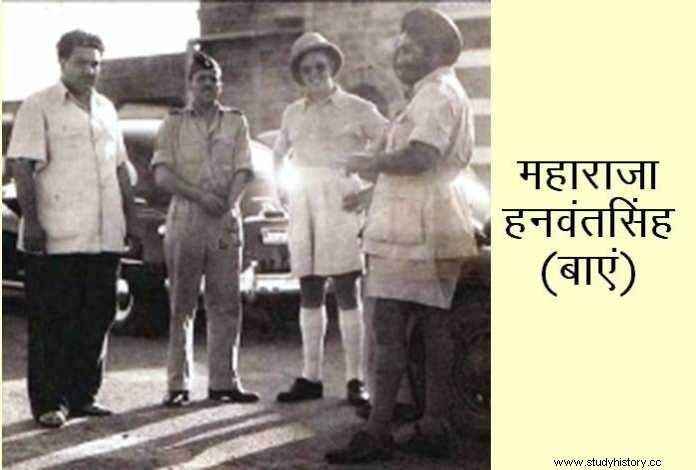
On 16 July 1947, V.P. Menon gave a telegram to Sir Patrick, the Deputy Secretary of India in England, that the Viceroy held talks with the representatives of Mysore, Baroda, Gwalior, Bikaner, Jaipur and Jodhpur about accession to India. All of them had a positive response. On 2 August 1947, Menon informed Patrick that almost all the kings of India had agreed to merge their states into the Indian Union.
Only Hyderabad, Bhopal and Indore are hesitating. The Viceroy has spoken to the native kings and the kings of these states have agreed to join the Indian Union – Gwalior, Patiala, Kota, Jodhpur, Jaipur, Rampur, Navanagar, Jhalawar, Panna, Tehri Garhwal, Faridkot, Sangli, Sitamau , Palitana, Falton, Khairagarh, Sandur.
Although the state of Jodhpur was participating in the Constituent Assembly since April 28, 1947, and the young Maharaja of Jodhpur, Hanwant Singh, had twice announced to meet in India, but he was involved in the creation of Pakistan, Muhammad Ali Jinnah and Pakistan, just 10 days before the country got independence. The Nawab, who supported him, came in the midst of the Maharajrana of Bhopal and Dholpur.
When Rajputana's plan to form an independent group of states failed, pro-Pakistan members of the Political Department advised the Rajputana states to merge with Pakistan, as India was legally allowed to do so on the border with Pakistan. Were. Of these, the state of Jodhpur was one. Maharaja Hanwant Singh hated the Congress and the princely state of Jodhpur was attached to Pakistan. Therefore Hanwant Singh thought of meeting Jinnah.
Jinnah and the leaders of the Muslim League had met the king of Jodhpur several times and in the last meeting they also took the Maharajkumar of Jaisalmer along. The king of Bikaner refused to accompany him and Hanwant Singh was hesitant to go to Jinnah alone. Jinnah's eyes blossomed on seeing those people. Jinnah knew that if these two princely states joined Pakistan, then other Rajput princely states would also join Pakistan.
This will also fill the gap in the division of Punjab and Bengal and the Congress plan to annex all the major princely states will also fail. Jinnah signed a blank paper and gave it with his pen to the king of Jodhpur and said that you can fill in whatever conditions you want. After this some discussion took place. On this Hanwant Singh agreed to meet in Pakistan.
Then he turned to Maharajkumar of Jaisalmer and asked him if he would also sign. Maharajkumar said that he was ready to sign a condition that if there was a dispute between Hindus and Muslims, Jinnah would not take the side of Muslims against Hindus. It was like a detonation of a bomb which stunned Maharaja Hanwant Singh. Jinnah put great pressure on Hanwant Singh to sign the document.
When Maharajkumar Jaisalmer refused to merge with Pakistan, the Maharaja was in turmoil. Taking advantage of this opportunity, Maharaja K. D.C. Col. Kesari Singh advised the Maharaja to consult his mother before taking the final decision. The Maharaja got this excuse and said goodbye to Jinnah saying that he would give his decision in a day or two after thinking about it.
Colonel Kesari Singh returned to Jodhpur and met Prime Minister C.S. Venkatachar apprised of the facts. Seeing the seriousness of the conspiracy, Venkatachar sent a letter to Sardar Pannikar, the Prime Minister of Bikaner state on 6 August 1947. It was written in the letter that Bhopal Nawab Maharaja had taken Jodhpur to meet Jinnah. Jinnah offered that he was ready to make a treaty by recognizing Jodhpur as an independent state.
He also offered that the weapons required by the state of Jodhpur could be brought from the port of Pakistan without 'marginal-tax' Given can be brought. Jinnah offered to make Maharaja Jodhpur the sovereign of Rajasthan, due to which the Jodhpur Maharaja was astonished and a desire arose in his mind that he would become the emperor of Rajasthan. The Maharaja's secretary Colonel Kesari Singh had accompanied the Maharaja to Jinnah's residence but was not allowed inside.
So he was not aware of the full conditions. When the Maharaja went to meet Jinnah along with the Nawab of Bhopal the next day, the draft of the treaty was ready for signature. At that time the Maharaja told Kesari Singh that by signing the treaty I would become the king of Rajasthan. Kesari Singh explained to them that they should not do this and before doing so, they should discuss with their mother and other relatives.
On this the Maharaja bid farewell to Jinnah by assuring him that he would sign the treaty on 8 August in consultation with other members of his family. Kesari Singh also reiterated this assurance. Returning to Jodhpur, Hanwant Singh called a meeting of the vassals of the state at Sardar Samand Palace and wanted to know their opinion. Apart from Damli Thakur, no other Jagirdar was ready to fight with the Government of India.
The Maharaja stayed in Jodhpur for three days. There was a lot of anger in the atmosphere of Jodhpur on the question of joining Pakistan. When Hanwant Singh returned to Delhi after three days, Menon was told that if Menon did not take over the Maharaja soon, he could join Pakistan. Menon requested Mountbatten to agree the Jodhpur Maharaja to join India.
